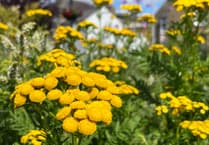Farmers on Penwith Moors say they may have to give up their livelihoods because of a conservation project which has banned them from using certain farming methods.
Natural England wants to designate the historic moorland a Site of Special and Scientific Interest (SSSI) in recognition of its national importance for wildlife.
The chosen area covers 59 parcels of semi-natural habitat and farmland spanning more than 3,100 hectares, stretching from St Just to St Ives.
Natural England said Penwith Moors is packed with wildlife and archeology and has a long history of agriculture and livestock grazing, with many of the 4,000-year-old field systems still used for their original purpose.
Area manager of the organisation, Wesley Smyth, said the team will continue to work in partnership with landowners, farmers and the community to promote sustainable land management practices which benefit habitats and species, support conservation and prevent damaging activities from taking place.
In a statement when the announcement was made, he said: “This SSSI designation will help protect and restore sites of national importance to wildlife, with farming and nature continuing to co-exist and shape the landscape.
“We will continue to support farmers and the people who live, work and visit the Penwith Moors to drive nature recovery and support sustainable uses for this site.”
However, farmers say they have received letters telling them areas of land they own will fall under this new designation and some of the methods they use are no longer allowed.
Eric Murley of Higher Bojewyan, between Pendeen and Morvah has two dairy farms with 250 Jersey cows.
He said: “My wife Mary and I have been farming since 1976 and we have a lot of pasture land we graze our cows on.
“There is a small area of bog land and we’ve got fields around that which have been designated because possibly they feed into this bog.
“We own the land but we now have 26 conditions and one of these is we’re not allowed to spread lime.
“The natural soil here is acid so we spread lime to bring it to neutral; it’s the only way we can grow any decent crops – but they’re telling us it’s forbidden.
“We’ve had three meetings but it’s a total shambles; they will not engage with us and discuss this, despite telling everyone they’re working with the community. People are extremely angry.
“We have been given no compensation either – they appear to have a legal charge over our land but there is no compensation whatsoever.
“We had letters asking us permission for people to go on the land for surveys and we agreed but now we’re being told what we can and can’t do.
“My sons work on the farm and are saying ‘why are we bothering with this if this is the way they’re going to treat us?’”
The National Farmers’ Union said it is aware of the concerns members have about Natural England’s proposal.
A spokesperson told the Voice: “Looking after the environment is part and parcel of farming and much of the moors are already under environmental designations of one kind or another, but the SSSI proposed would include a much larger area and potentially have a bigger impact on farm businesses.
“We are currently in a consultation period, during which anyone can make an objection or representation through the web page at gov.uk (https://consult.defra.gov.uk/natural-england/penwith-moors/) and the NFU is encouraging all farmers and food producers who may be impacted to engage in this process.
“Equally, we expect Natural England to recognise the uncertainty and concern farmers will be feeling and to engage in constructive dialogue with them – this process has already started with meetings held in the local area.”
Natural England said the fields have been included because rainfall there either flows as surface water or seeps through cracks in the granite bedrock and feeds the wildlife-rich valley wetlands.
The organisation said the habitats in the area are naturally acidic and low in nutrients and the wildlife they host is adapted to thrive in those conditions.
It said applying lime and nutrients to the fields changes the chemical qualities of the water flowing into the valley wetlands, which over time damages the habitats and their ability to support wildlife and store carbon.
Land management operations within SSSIs require Natural England’s consent (a type of legal permission) in order to be undertaken lawfully and Natural England needs to consider whether or not an operation will damage the special interest of the SSSI when deciding on issuing a consent.
A spokesperson for Natural England said the organisation would provide consent for the majority of established farming activities – including application of lime, manure and other fertilisers for five years to allow farm businesses to transition to low-input land management.
But it wants to reduce the use of lime and the amount of nitrogen entering groundwater in order to restore and maintain valley wetlands in good ecological condition.
The spokesperson added: “During this transition we will continue to provide advice and would encourage farmers to apply for the Countryside Stewardship scheme.
“We wish to work with farmers to seek regimes which are sustainable, both environmentally and financially. We have an open invitation for farmers and other landowners to contact us should they wish to discuss any aspect of the SSSI notification.
“Local staff have met with many farmers and other landowners prior to notification and we are in the process of contacting those farm businesses affected to offer further advice.
“During the consultation period we will continue to try to resolve any objections before a final decision is made on whether or not to confirm SSSI status.”
The land was designated on October 7 but objections will be considered until February 7, when the Board of Natural England has the option to approve the SSSI as currently notified, add amendments to reduce boundaries or withdraw the notification altogether.
If the Natural England Board approves the SSSI notification Natural England will write to all owners and occupiers to confirm this by no later than July 6.




